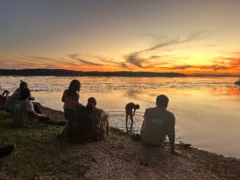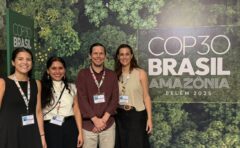Cayetano Heredia promotes innovative solutions to climate change together with OEI and CAF

Our university, in co-organization with the Organization of Ibero-American States (OEI) and with the support of the Development Bank of Latin America and the Caribbean (CAF), held the forum “Main Problems Affecting Climate Change.” This space brought together prominent national and international stakeholders with the purpose of generating concrete proposals that will be presented at COP30, to be held next November in the city of Belém, Brazil.
The opening remarks were given by Mr. Santiago Rojas, CAF’s Northern Regional Manager, and Mr. Mariano Jabonero Blanco, Secretary-General of the OEI, who emphasized the need to strengthen regional cooperation to address the effects of climate change.
The event was structured around two thematic blocks: the first focused on climate financing and the Tropical Forests Forever Fund (TFFF), an international mechanism led by Brazil that seeks to reward countries reducing deforestation through a global investment fund; and the second, on climate perspectives and policies toward a sustainable future.
Dra. Stella Hartinger, Co-Director of the Latin American Center of Excellence on Climate Change and Health (Clima) at our university, presented the lecture “Impacts of Climate Change and Health in Latin America,” highlighting the importance of scientific evidence for the formulation of public health policies.
The event also featured the participation of representatives from the Ministry of the Environment (MINAM), the National Service of Natural Protected Areas (SERNANP), the Consortium for the Sustainable Development of the Andean Ecoregion (CONDESAN), the National Institute of Health (INS), the Pontifical Catholic University of Peru (PUCP), the Andean Health Organization (ORAS-CONHU), and the Embassy of Brazil, among other institutions.
The meeting concluded with remarks by Dr. Enrique Castañeda, Rector of our university, who stated: “Climate change is one of the greatest challenges of our time and requires the joint efforts of academia, the State, and international organizations to generate sustainable solutions that safeguard the health and well-being of our communities.”
Through this participation, Cayetano reaffirms its leadership and commitment to research, academic training, and the development of innovative proposals to address the impacts of climate change in Peru and across the region.
 EN
EN
